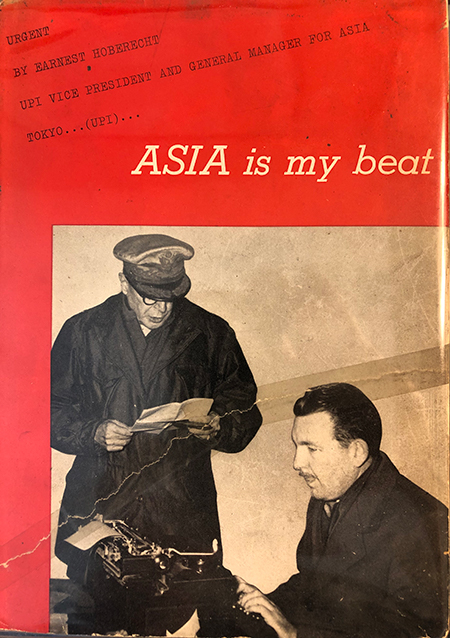 The following is another installment in a series of reviews by William J. Holstein as he pores over a collection of books that were donated anonymously to the OPC in April.
The following is another installment in a series of reviews by William J. Holstein as he pores over a collection of books that were donated anonymously to the OPC in April.
by William J. Holstein
When I was a young pup at United Press International in Hong Kong, the old-timers used to refer reverentially to Ernie Hoberecht (pronounced HO-bright) as if he were in the pantheon of the gods. I had no idea who he was and never met him.
So I was delighted that, as a result of an anonymous donation, the OPC recently acquired, Asia is My Beat, by Earnest Hoberecht. It was published in Japan, where Hoberecht was based, in 1961, so it has had not wide circulation in the United States. James A. Michener introduces him as “America’s Greatest Writer.” Not bad for someone born in Watonga, Oklahoma.
If you don’t love Hoberecht’s opening passage, you may return to your sandbox. “The news business is the best business in the world,” he starts. “The best job in the news business is to be a foreign correspondent. The best place to be a foreign correspondent is in Asia. This makes me one of the luckiest people in the world.”
He goes on to add: “Foreign correspondents and war correspondents are the watchdogs, the seeing eyes, the seekers of truth for those people who have to stay home and depend on somebody else to go out and report back on what’s happening.”
Starting in 1942, he covered World War II, the Japanese surrender on the U.S.S. Missouri, the hanging of seven Japanese war criminals and the Korean War, among other major stories. He knew General Douglas MacArthur well, as the book’s scotch-taped cover image attests. “It was on the third day of the Korean War that General MacArthur called me to his office on the sixth floor of the Dai Ichi building and told me in secret that he intended to make a trip to the fighting front (in Korea) the next day – and asked me to accompany him,” Hoberecht writes. Several other journalists and generals went with MacArthur to Suwon, south of the South Korean capital of Seoul. The North Koreans had already swamped Seoul. China was not yet directly involved in the war.
Hoberecht writes movingly about visiting Shanghai in 1947, a city I also found most captivating. At that time, the Japanese had been defeated, but the Chinese Civil War still raged in the countryside. Hoberecht does not claim to be a Chinese expert but he writes about what his eyes can see – gangsters, rickshaw boys and 100,000 opium addicts. Shanghai, he writes, “offered people a taste of riches and poverty. It was a city that inspired all the emotions.” His presence in China at that time would have put him in the same theater as our Seymour Topping and Roy Rowan. I wonder whether they ever raised a glass at the famous Long Bar!
Speaking of watering holes, Hoberecht was a charter member of the Foreign Correspondents Club of Japan in November 1945. He dreamed up the address, No. 1 Shimbun Alley. He would be gravely disappointed by what has happened to the club now that the Western media has pulled so many correspondents out of Tokyo.
